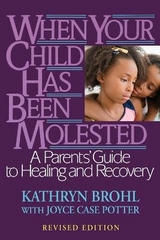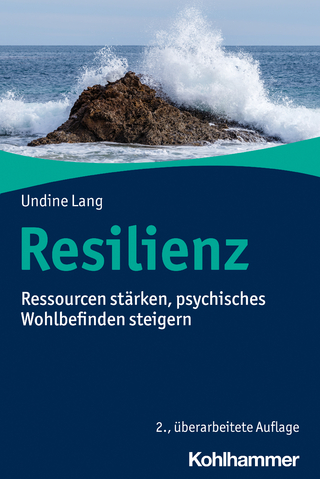
When Your Child Has Been Molested
Jossey-Bass Inc.,U.S. (Verlag)
978-0-7879-4073-7 (ISBN)
- Titel erscheint in neuer Auflage
- Artikel merken
KATHRYN B. HAGANS is a licensed marriage and family therapist, with a therapy and consulting practice in Miami. She has trained mental health professionals in Australia, Canada, and throughout the United States. JOYCE CASE is a freelance writer based in Jasper, Georgia, and has served on the board of directors of Concerned Citizens for Sexually Abused Children, in Lee Country, Florida.
1. Learning That Your Child Has Been Molested: Who Molests Children? Facts About Abuse and Abusers. Types of Molesters. Common Reactions by Parents When Their Children Disclose the Molestation to Someone Else First. 2. The Importance of Reporting the Abuse and What Happens Next: Overcoming the Temptation to Not Report the Abuse. The Team Approach to Investigating a Molestation. Possible Members of the Investigating Team. Frequently Followed Steps in the Criminal Processing of an Abuse Report. If the Offender is Living in Your Child's Home. Explanations of Hearings, Arraignments, Continuances, Guardian Ad Litem. When a Probate/ Juvenile Court, Family Court, or Civil Court Might Become Involved. 3. Believing Your Child's Reality: Your Reactions to Hearing of the Abuse: What Can Help, What Can Harm. Helpful Phrases to Use With Your Child. Sexual Molestation Defined. A Child's "Truth". Children's Difficulties in divulging Molestations. Samples of Molesters' Threats to Victims. The Way Molestations Often Progress. Problems That Develop When Children are not Believed. False Reports are Uncommon. The Importance of Not Jumping to Conclusions. 4. Normal Sexual Development and Behaviors Indicating Possible Sexual Abuse: "Normal' Sexual Development by Age. Physical Conditions and Behaviors Indicating Abuse. 5. The Professional with Whom You Might Work: A Sample Investigative Team. Probable Duties of Each Professional. Protecting Your Child's Welfare. 6. How to Help Investigators Work Effectively with Your Child: Talking with Your Child before the Interview(s). Writing Down Questions and Information. The Investigative Interview(s). Videotaping. Use of Anatomically Correct Dolls and Drawings. Why Even a Good Interviewer May Have Trouble Getting Information From Your Child. Behavior You Can Expect From Your Child. Behavior You Can Expect From Your Child (By Age) During the Interview(s). Behaviors Victims Parents Have Regretted. 7. Why Does Everything Take So Long?: Coping with the Slow Legal Process. The Stress of Added Demands on You and Your Family. False Expectations. Slow Doesn't Mean Stopped. Offender May Free on Bond After Arrest. Accepting Offender's Constitutional Rights. Accepting Your Lack of Control in a Criminal Proceeding. Focusing on Helping Your Child and Your Family. Understanding and Accepting Delays. 8. Steps to healing: The Grief Process: Typical Stages of Grief. How Feelings in Each Stage are Expressed. Shock and Denial. Anger. Guilt and Depression. Bargaining. Acceptance. Working Through the Stages. 9. How to Help Your Child Cope, and How to Select and Work with a Therapist: Not Minimizing or Overreacting tot he Molestation. Reactions to Your Child's Behaviors. Feeling Overwhelmed. Recognizing Your Family's Need for Therapy. Questions to Ask to Help Select a Therapist. How to Get the Most from Your Therapy. 10. Dealing with Your Family's Feelings of Guilt: Guilt Feelings Experienced by Various Family Members. An Example of How Therapy Might Progress. 11. Healing the Communication Process within Your Family: Communicating to Help Work Through Problems. Indications of Communication Breakdowns Within the Family. Breaking Free of Old Habits. Openly Expressing Feelings and Needs. Resistance to Therapy. Solving Communication Problems. The Therapist as a "Family Coach". Practicing New Communication Techniques. 12. What to Say to Extended Family Members, Friends, and Others: If There is Newspaper Coverage. Talking with Family Members. Being Prepared for Others' Reactions. What You Can Say. Responding to Others' Comments. Protecting Your child's Privacy. Divisions Within Families. Comments You May Hear From Others. Preparing Your Child to Respond to Comments. When Children Speak Out Inappropriately. Feeling that You Are In Control. 13. When Your Child--or You--Must Appear in Court: Explanation of Preliminary Hearings and Grand Jury Hearings. Depositions. Videotaped Testimony. Why You Probably Can't Be There. Visiting A Courtroom. Telling Your Child Who Will Be at the Trial. Explaining the Questions and Procedures That Can Be Expected. Stressing the Importance of Telling the Truth. Why Juries Might Not Convict. Preparing Your Child (and Yourself) for a Possible Not Guilty Verdict. 14. When the Molestation Is Incest: Incest defined. Your Responsibilities as the Nonoffending Parent. State custody of Your Child. Your Feelings toward the Molester. Pressures on You to Doubt Your Child. Disruption Within Families. Overcoming Feelings of Helplessness and Despair. Incest Indicates Other Family Problems. Complications of Divorce, custody, or Visitation Disputes. Testimony of "Hired Guns". Expect Lengthy Therapy. 15. You Know Your Family Is Getting Better When...: Looking Back. The Molestation as a Learning Experience, Teaching Children to Say No. Looking Ahead.
| Erscheint lt. Verlag | 19.12.1997 |
|---|---|
| Verlagsort | New York |
| Sprache | englisch |
| Maße | 158 x 241 mm |
| Gewicht | 255 g |
| Themenwelt | Sachbuch/Ratgeber ► Gesundheit / Leben / Psychologie ► Lebenshilfe / Lebensführung |
| Sachbuch/Ratgeber ► Gesundheit / Leben / Psychologie ► Psychologie | |
| Sozialwissenschaften ► Soziologie | |
| ISBN-10 | 0-7879-4073-9 / 0787940739 |
| ISBN-13 | 978-0-7879-4073-7 / 9780787940737 |
| Zustand | Neuware |
| Haben Sie eine Frage zum Produkt? |
aus dem Bereich



